
Did you know you’re born with all the eggs you’ll ever have? But that doesn’t mean they’re all ready for action! A little hormone called AMH can tell you how many are waiting in the wings and how easy it might be to get pregnant. In this blog, Dr Jagrati Laad, a fertility specialist in Pune, will clear all your doubts about AMH and fertility.
Let’s begin!
What is AMH?
AMH, or Anti-Müllerian hormone, is a hormone produced by the ovaries that plays a crucial role in fertility. It is commonly used as a marker to assess a woman’s ovarian reserve. Understanding your AMH levels can provide valuable insights into your reproductive health and help you make informed decisions regarding family planning.
AMH levels are typically measured through a blood test. The results can indicate how many eggs a woman has remaining in her ovaries, which can be an essential factor in assessing fertility potential. Higher AMH levels suggest a higher ovarian reserve, meaning that a woman may have a larger number of eggs and a better chance of conceiving. Conversely, lower AMH levels may indicate a reduced ovarian reserve and potentially diminished fertility.
It’s important to note that while AMH levels offer valuable information, they do not provide a definitive answer about a woman’s ability to conceive. Many other factors, such as age, overall health, and the presence of any underlying reproductive conditions, can also influence fertility.
Understanding your AMH levels can be particularly helpful if you are considering assisted reproductive technologies, such as in-vitro fertilization (IVF). It can help your doctor determine the ideal treatment protocol and predict how you may respond to ovarian stimulation medication.
Additionally, knowing your AMH levels can also provide insights into other aspects of your reproductive health. For example, women with polycystic ovary syndrome (PCOS) often have higher than average AMH levels. Monitoring AMH levels can help in diagnosing and managing this condition.
It is worth noting that AMH levels can fluctuate throughout a woman’s reproductive years. They tend to be higher during the late teenage years and early twenties, gradually declining as a woman ages. Therefore, discussing your AMH levels with a reproductive endocrinologist or fertility specialist is recommended, who can provide a more accurate interpretation based on your age and circumstances.
In Hurry?
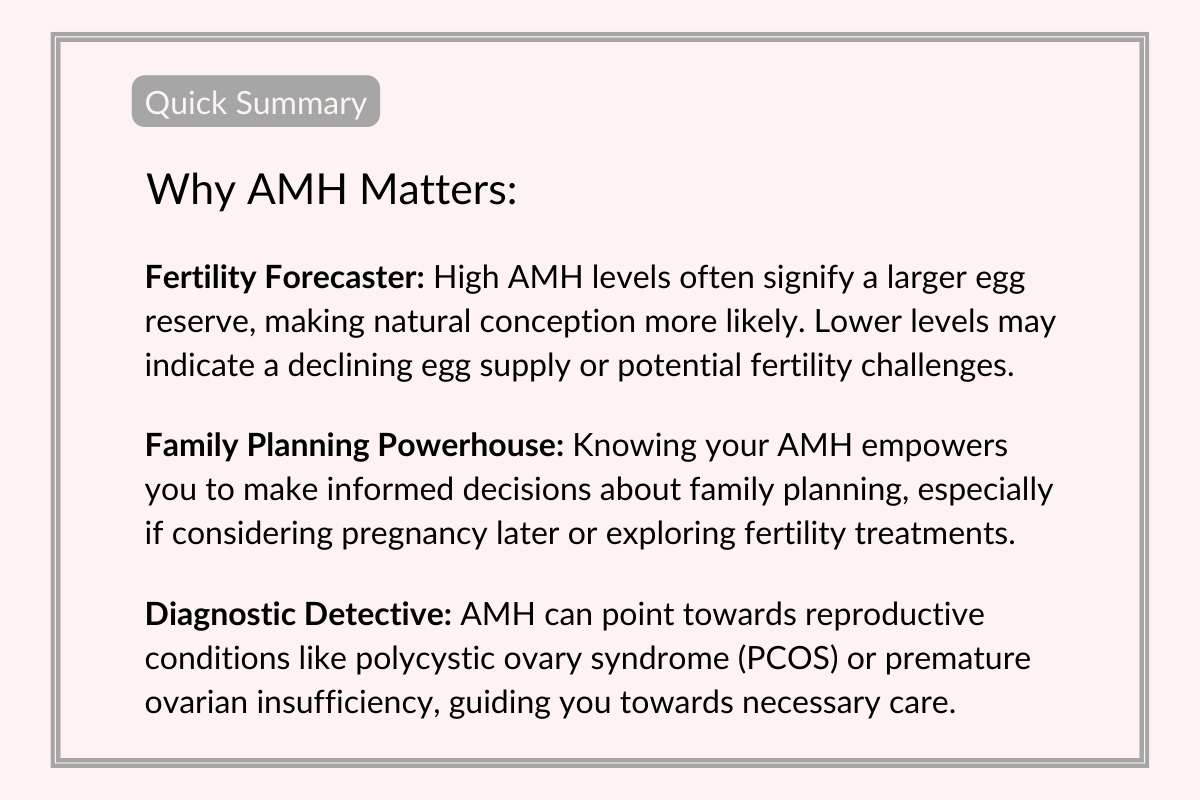
Why AMH matters
How AMH influences the development of reproductive organs in fetal stages and changes throughout a woman’s life.
Understanding the functions and fluctuations of AMH is crucial for comprehending reproductive health, fertility, and potential issues that may arise.
During fetal development, AMH is secreted by the Sertoli cells in male embryos, causing the regression of Müllerian ducts, which are responsible for the development of female reproductive organs such as the uterus, fallopian tubes, and upper vagina. This hormone prevents the formation of these structures in males, contributing to the differentiation of male reproductive organs. In females, the absence of AMH allows the Müllerian ducts to develop into functional reproductive organs.
Once a female reaches puberty, AMH levels decrease due to the maturation of the ovarian reserve. This decline is a natural process and is associated with the maturation of the ovarian follicles, which contain immature eggs.
AMH levels can then provide valuable insights into a woman’s ovarian function and egg supply. A higher level of AMH indicates a larger ovarian reserve, which is associated with increased fertility, while lower levels may suggest diminished fertility or indicate certain reproductive disorders. Therefore, measuring AMH levels can be a useful tool for assessing a woman’s reproductive potential and predicting the response to fertility treatments like in vitro fertilization (IVF).
AMH levels continue to decline as women progress through their reproductive years, and this decline accelerates as menopause approaches. Menopause marks the end of a woman’s fertility and is characterized by the cessation of menstrual periods and hormonal changes, including decreasing levels of estrogen and AMH. As AMH levels decrease, it becomes more challenging for the ovaries to produce mature eggs, leading to infertility and the accompanying symptoms associated with menopause, such as hot flashes and mood swings.
For women trying to conceive, tracking AMH levels can provide insights into their ovarian reserve and help determine the optimal timing for pregnancy. Women who wish to postpone pregnancy can also benefit from knowing their AMH levels, as it can provide an estimate of their remaining fertile years.
In addition to fertility assessments, AMH levels can help diagnose certain reproductive conditions and disorders. For example, high AMH levels in women with polycystic ovary syndrome (PCOS) are often observed due to the increased number of small follicles in the ovaries. Conversely, low AMH levels can indicate conditions such as premature ovarian insufficiency or primary ovarian insufficiency, where the ovaries stop functioning earlier than expected.
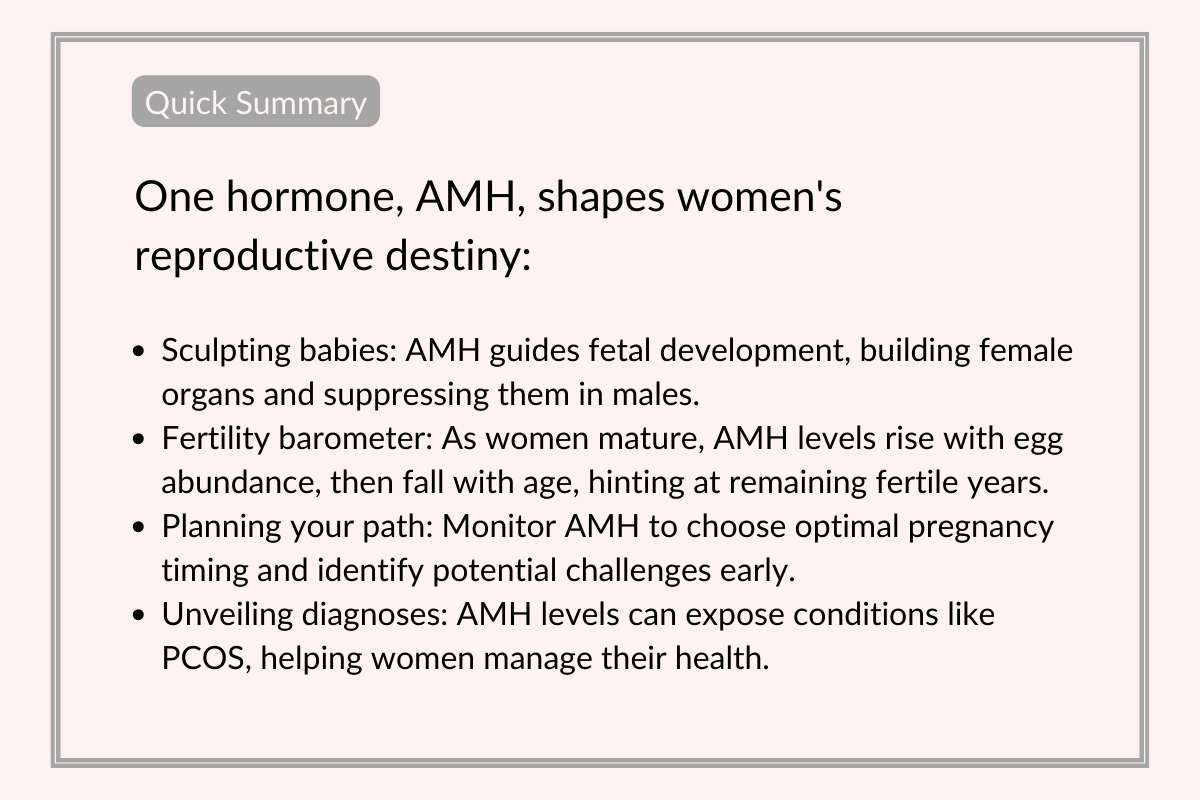
How AMH influences the development of reproductive organs
What AMH Can Tell You About Your Fertility?
AMH and egg reserves:
AMH is produced by the cells in a woman’s ovarian follicles, which are responsible for producing eggs. The ovarian reserve is like a basket of eggs. We are typically born with a basket full of eggs, and those eggs get used up over our lifetime. The level of AMH in the blood is directly correlated with the number of egg reserves in the ovaries. Higher AMH levels indicate a larger number of eggs, while lower levels suggest a diminishing egg supply.
Knowing your AMH level can help in assessing the quantity of your egg reserves. This information is particularly useful for women who are planning to conceive or are considering fertility treatments like egg freezing or in vitro fertilization (IVF). A low AMH level may indicate a diminished ovarian reserve, making it important to seek medical advice for appropriate family planning.
Insights into menopause:
AMH levels can also provide insights into menopause, the natural process of the cessation of menstrual cycles and the end of a woman’s reproductive phase. As women approach menopause, their AMH levels start to decline. Monitoring AMH levels can help determine the proximity to menopause and aid in family planning decisions.
Reproductive health conditions:
AMH levels can also indicate certain reproductive health conditions. For instance, polycystic ovary syndrome (PCOS), a common hormonal disorder among women, is often associated with elevated AMH levels. On the other hand, conditions like premature ovarian insufficiency (POI) or primary ovarian insufficiency (POI) can result in low AMH levels, indicating compromised ovarian function.
Potential fertility challenges:
AMH levels can provide insights into potential fertility challenges. A low AMH level can indicate diminished ovarian reserve, reducing the chances of successful natural conception. It can also help identify women who may require more aggressive fertility treatments, such as IVF, to overcome fertility challenges. While AMH levels can provide valuable information about fertility status, it is important to note that they are just one piece of the puzzle. Other factors, such as age, overall health, and medical history, also play a significant role in determining fertility potential. Therefore, it is always advisable to consult with a fertility specialist for a comprehensive evaluation.
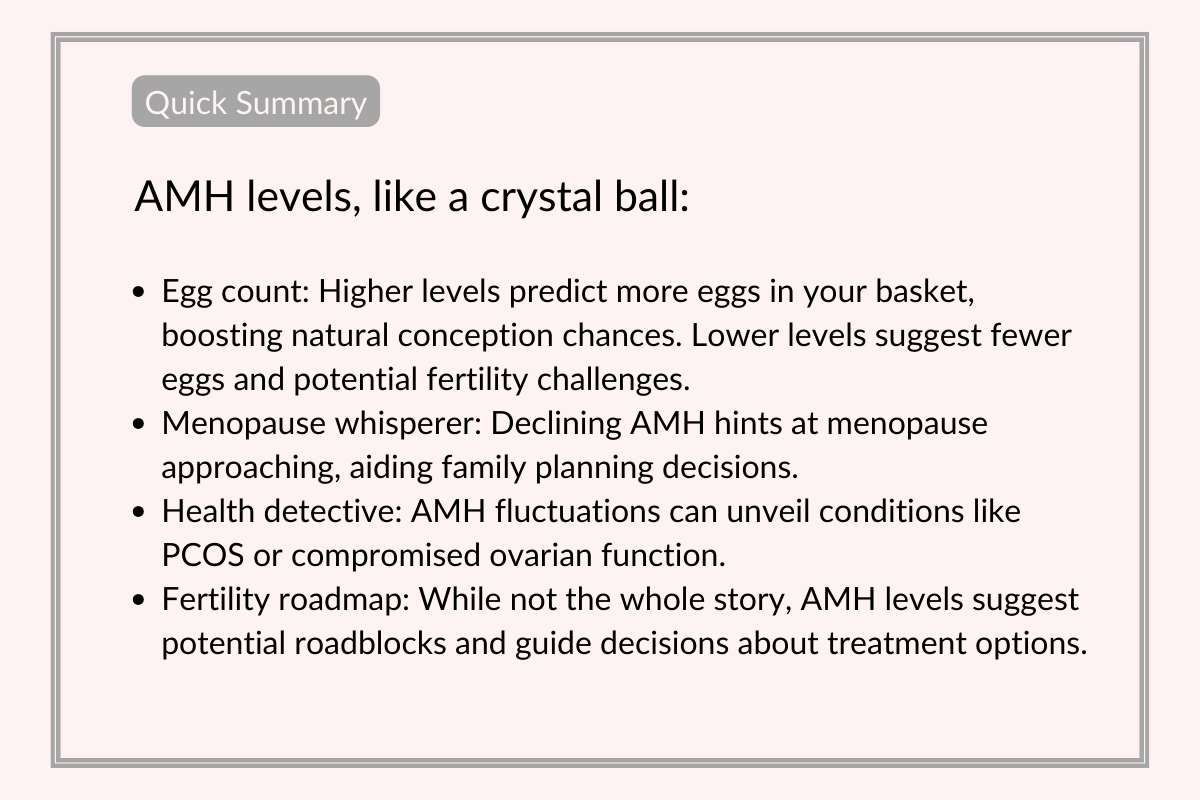
what AMH can tell you about your fertility
What Affects Your AMH Levels?
One of the most common health conditions that can impact AMH levels is Polycystic Ovary Syndrome (PCOS). PCOS is a hormonal disorder that affects many women of reproductive age. Women with PCOS often have higher than normal AMH levels due to an increased number of small follicles in the ovaries. These small follicles produce excess AMH, leading to elevated levels in the blood.
While high AMH levels are generally positive, they can also be associated with conditions like Polycystic Ovary Syndrome (PCOS). PCOS, characterized by irregular menstrual cycles and cysts on the ovaries, can lead to fertility challenges despite the abundance of eggs.
In fertility treatments, particularly IVF, there is a potential risk of Ovarian Hyperstimulation Syndrome (OHSS) with high AMH levels. OHSS occurs when the ovaries over-respond to fertility medications, leading to swelling and discomfort.
On the other hand, certain health conditions, such as ovarian tumours or cysts, can cause a decrease in AMH levels. Ovarian tumours, both benign and malignant, can disrupt the normal functioning of the ovaries and lead to a decrease in AMH production. Additionally, surgical removal of ovarian tissue or chemotherapy and radiation treatments can also lower AMH levels.
Age is another significant factor that affects AMH levels. As women age, their ovarian reserve naturally declines, leading to a decrease in AMH levels. This decline is a normal part of the ageing process and indicates a decrease in the number of eggs available for fertilization.
Apart from these health conditions and treatments, lifestyle factors, such as smoking and excessive alcohol consumption, can also impact AMH levels. Studies have shown that women who smoke tend to have lower AMH levels compared to non-smokers. Similarly, heavy alcohol consumption has been associated with decreased AMH levels.
It’s important to note that while AMH levels can provide valuable information about ovarian reserve and fertility potential, they should not be considered as the sole determinant of fertility. Other factors, such as the regularity of menstrual cycles and the quality of eggs, also play a significant role in fertility.
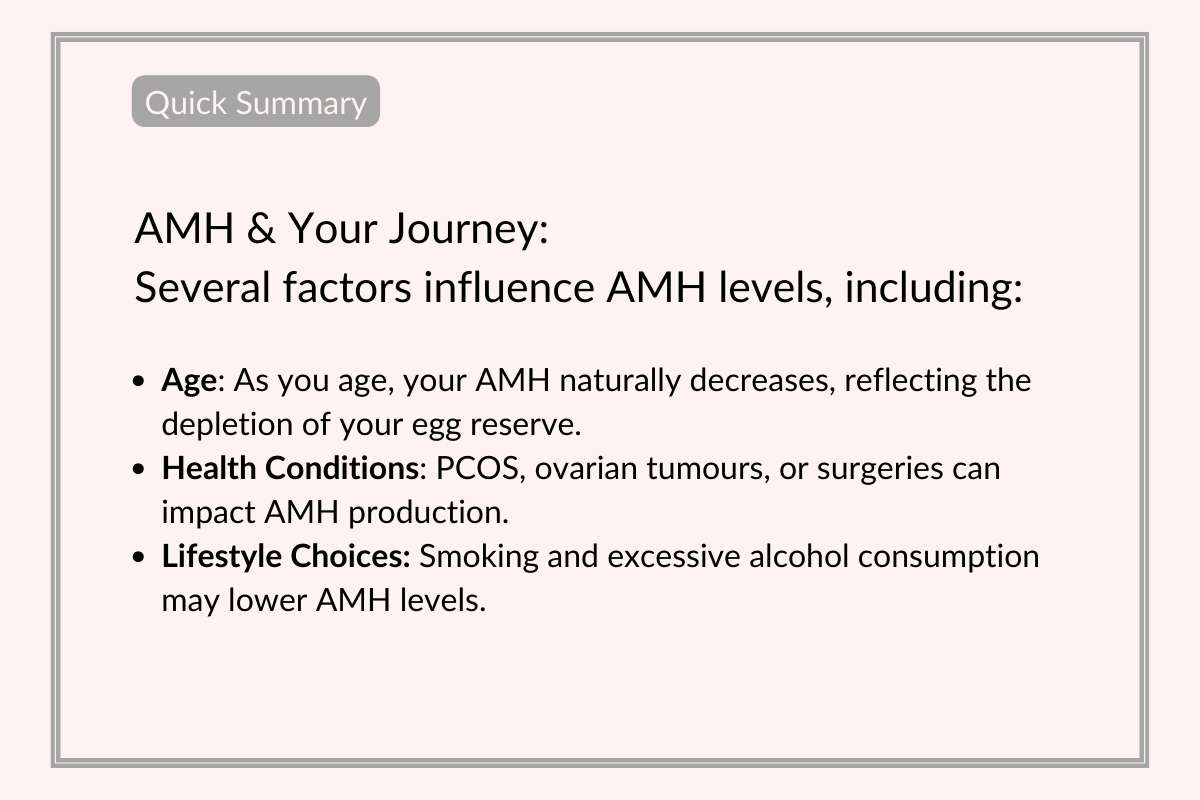
Factors that influence AMH levels
AMH and Your Fertility Journey
IVF is often recommended for individuals or couples facing fertility challenges such as blocked fallopian tubes, low sperm count, advanced maternal age, or unexplained infertility.
The level of AMH in a woman’s blood is an essential tool for assessing a woman’s ovarian reserve – the quantity of her eggs. Ovarian reserve is a crucial factor in predicting the success of IVF treatments as it gives insight into the likelihood of producing multiple eggs during the stimulation phase of IVF.
During an IVF cycle, the woman undergoes ovarian stimulation to encourage the development of multiple eggs. This is achieved through the administration of hormonal medications. The response to these medications can vary from person to person, and AMH levels serve as a valuable indicator of how a woman’s ovaries will respond to stimulation. Generally, individuals with higher AMH levels tend to have more follicles (structures containing the eggs) available for stimulation. This can increase the chances of a successful IVF cycle by providing a larger pool of eggs to work with.
AMH levels can also help determine the appropriate dosage of stimulation medications to achieve the desired outcome. By tailoring the medication dosage to a woman’s ovarian reserve, fertility specialists can optimize the chances of obtaining a sufficient number of mature eggs for fertilization.
Additionally, AMH levels can help identify individuals at risk of a poor ovarian response to stimulation. Low AMH levels may indicate a diminished ovarian reserve, making it more challenging to obtain an adequate number of eggs during the IVF cycle. In such cases, fertility specialists may explore alternative treatment options or adjust the stimulation protocol accordingly.
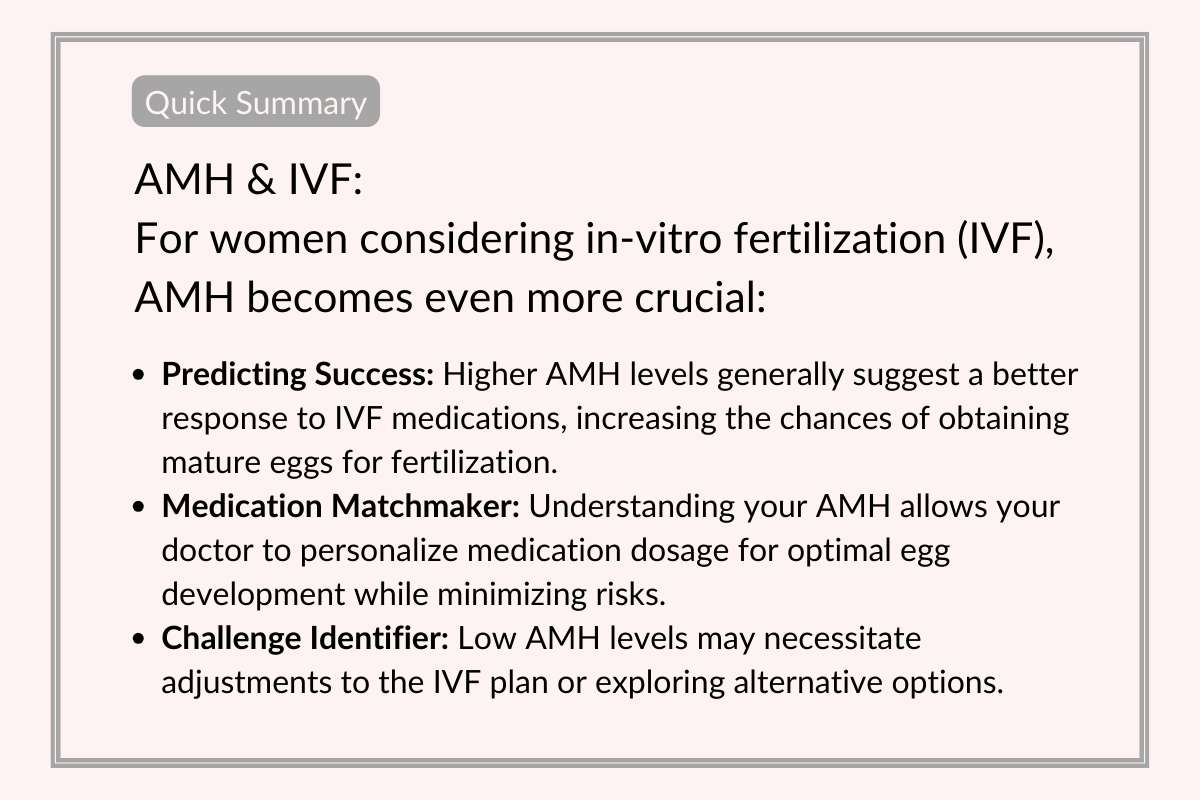
AMH and IVF
Unveiling the secrets of AMH is just the first step on your empowering fertility journey. While it offers invaluable insights, remember that age, overall health, and other factors also dance in the grand waltz of reproduction.
Embrace this multifaceted landscape of your body. Seek support from a fertility specialist, a partner in deciphering its unique rhythm. Together, you can craft a personalized plan, whether it whispers sweet lullabies of natural conception or orchestrates the marvels of assisted technologies. Whatever path resonates with your heart, let the knowledge gleaned from AMH guide you forward with confidence and hope.











